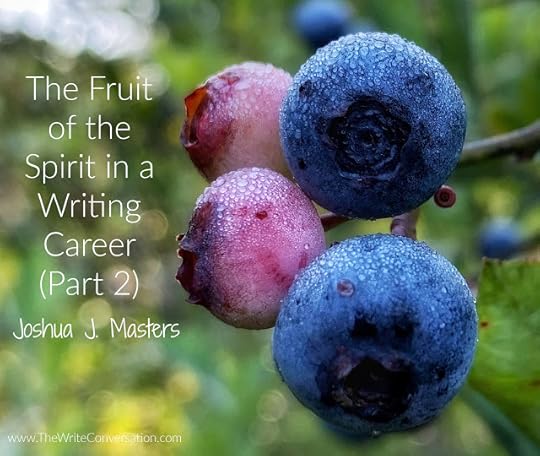Edie Melson's Blog, page 145
November 11, 2021
The Fruit of the Spirit in a Writing Career (Part 2)

by Joshua J. Master @JoshuaJMasters
“If God has called me to write—if His purpose in creating me is crafting words to glorify His name, then should I not experience the Fruit of the Spirit in my writing career?”
That’s the question we asked in last month’s column.
As we pursue the calling God has placed in our lives to write, it should draw us closer to Him. And that will produce the fruit we see described in the book of Galatians:
… the Holy Spirit produces this kind of fruit in our lives: love, joy, peace, patience, kindness, goodness, faithfulness, gentleness, and self-control. (Galatians 5:22-23a NLT)
In part one of this article, we explored how the first four traits (love, joy, peace, and patience) reveal themselves in our writing.
Now, we’ll continue with the remaining characteristics.
KINDNESSThe Greek word used for kindness is closely tied to goodness (which is the next trait in our spiritual fruit) but this word specifically refers to having the qualities of tenderness and compassion for others. So, the greatest threat to a Christian writer’s kindness fruit is a competitive spirit.
Have you ever felt a brief sting when you see someone’s “I’m signing a contract” photo on Facebook? What about that post with an oversized, gold award seal on another writer’s book? How we feel about the success and failures of other people is a direct reflection of our relationship with God. A tender, compassionate heart rejoices in the achievements of others and invests in the lives of those battling discouragement.
The act of writing may be solitary, but the life of a Christian writer is not. If you’re struggling with a competitive spirit, ask God to reveal who He wants you to encourage or build up. Be an ambassador of kindness in a world of rivalry.
GOODNESSIf kindness is about your relationship with others, goodness is about your relationship with God. The word used for goodness in this passage could more accurately be translated, “moral excellence.” That’s a little more intimidating, isn’t it?
None of us will be perfect until Christ completes His work in us on the day He returns (Philippians 1:6), but the closer we walk in the righteousness of Christ, the more effective we are in representing Him in our lives and writing. If, however, we’re living with a secret sin of willful disobedience, our writing ministry will become dull and ineffective.
Jesus called the Pharisees whitewashed tombs because they did everything right on outside but were dead on the inside. We can write the best turn of phrase and use all the right scriptures, but if our secret life is far from God, our writing won’t produce real fruit. Do we want our words to be a seemingly beautiful bowl of plastic fruit without purpose or a harvest of nourishment for those who read it?
Without condemnation, we should all ask God to reveal anything He needs to heal or restore in us (Psalm 139:23-24).
FAITHFULNESSThat last one seemed a little rough, didn’t it? But here’s the good news, there’s a proven path to a life of goodness. God is faithful. He’s faithful to His promises, to His plan, and to His children. And as we lean into His faithfulness, we develop that same trait in our own lives.
Faithfulness is living in the assurance and confidence of God’s purpose and plan. If God has called you to be a writer, He has a path and a plan to glorify His name through the gift He’s given you.
Stop measuring your career by what the world says you should be and start writing from the promise of who He’s made you to be.
Devote more time to discovering who you are in Christ by seeking a deeper relationship with the One who created you for a purpose greater than yourself. Goodness doesn’t come from beating yourself up or trying harder. Goodness is developed in our lives by basking in the goodness of God. And we do that by faithfully seeking Him in a deep, personal relationship.
GENTLENESSDeveloping gentleness is the next step in overcoming that spirit of jealousy we talked about in our description of kindness. The word has a deeper meaning in biblical writings that digs into the depth of our hearts. It means meekness and humility. I love the definition from Vine’s Complete Expository Dictionary of New Testament Words that calls gentleness “an inwrought grace of the soul.”
The greatest way to be used by God is to surrender to the way He wants to use you. We all have dreams for our writing careers, but can we find joy in our writing if God’s plan is different from our own (we talked about joy in Part 1 of this column)?
It’s so tempting for us to use the sentence, “I want God to use me” as a self-deceiving cover for a heart that cries, “I want God to make me successful.” But as we make our relationship with Christ a greater priority than our writing goals, our souls begin to desire God’s outcome for our writing rather than our own. And that humble posture always has a greater impact on your life and the Kingdom of God (Matthew 5:5).
SELF-CONTROLAt first glance, this might seem like another painful warning against sin, but the root of this word means strength—the strength of Christ living in you to overcome your own desires and live for His. There are countless blog posts extolling the necessity of discipline in your writing. For me, that’s virtually impossible in the flesh, but the Fruit of the Spirit makes the priorities of God’s mission for us our deepest longing.
The promise of the Spirit’s work is to place a desire for self-control and discipline in our hearts that won’t require spreadsheets or alarms. True strength isn’t curbing your desires but shifting them to a true love for what you should be doing.
THE HOPEAdmittedly, the second half of the list can feel more convicting than the examination of love, joy, peace, and even patience. But none of them are truly attainable without the Holy Spirit. These character traits aren’t called The Fruit of Discipline or The Harvest of Trying Harder. They’re the natural, God-given result of a life surrendered to the Gardener. A tree doesn’t try to grow a peach; the peach grows naturally as a loving caretaker nurtures the tree to be healthy.
Relying on our own ability to develop this fruit in our writing will only lead to frustration and withered dreams. But leaning into the care of the One who planted the seed of writing in your soul will result in a greater harvest and an unimaginable life of hope and purpose.
TWEETABLEThe Fruit of the Spirit in a Writing Career (Part 2) - encouragement from @JoshuaJMasters on @EdieMelson (Click to Tweet)
Don't Miss the Other Posts in this SeriesThe Fruit of the Spirit in a Writing Career, Part 1The Fruit of the Spirit in a Writing Career, Part 2
 Joshua J. Masters is a pastor, author, and speaker with a heart for encouraging others. His book on prayer, AMERICAN PSALMS, was a Serious Writer’s Book of the Decade finalist. He’s been featured on CBN Television, HIS Radio, the Light Radio Network, and worked in the film industry as a member of SAG-AFTRA performer. He is a regular teacher and speaker for large groups. A self-proclaimed sci-fi and comic book geek, Josh loves film, pop culture and is known in some circles as THE BAT PASTOR. Joshua was raised in the White Mountains of New England and now serves as a pastor in South Carolina where he lives with his wife, Gina, and their miniature poodle, FRANKLIN THE PUP, who is the subject of his latest book. Josh would love to connect with you on his website, JOSHUAJMASTERS.COM
Joshua J. Masters is a pastor, author, and speaker with a heart for encouraging others. His book on prayer, AMERICAN PSALMS, was a Serious Writer’s Book of the Decade finalist. He’s been featured on CBN Television, HIS Radio, the Light Radio Network, and worked in the film industry as a member of SAG-AFTRA performer. He is a regular teacher and speaker for large groups. A self-proclaimed sci-fi and comic book geek, Josh loves film, pop culture and is known in some circles as THE BAT PASTOR. Joshua was raised in the White Mountains of New England and now serves as a pastor in South Carolina where he lives with his wife, Gina, and their miniature poodle, FRANKLIN THE PUP, who is the subject of his latest book. Josh would love to connect with you on his website, JOSHUAJMASTERS.COM
Published on November 11, 2021 22:00
November 10, 2021
The Royal Treatment & An Audience of One

by Julie Lavender @JLavenderWrites
But you are a chosen people, a royal priesthood, a holy nation, God’s special possession, that you may declare the praises of him who called you out of darkness into his wonderful light. 1 Peter 2:9 NIV
My beauty treatment didn’t entail twelve months. In fact, the studio make-up and hair touchup activity probably lasted less than half an hour. Yet, while sitting in a chair tucked in a back room, I couldn’t help but feel a bit like Esther from the seventeenth book of the Old Testament, preparing to go before an audience of one. Her one? King Xerxes, ruler of 127 provinces stretching from India to Cush.
My one? The only One who truly matters.
It all started back in early spring, when I received an email from my Revell publicist for 365 Ways to Love Your Child: Turning Little Moments into Lasting Memories.
“You have a pre-interview with Focus on the Family,” Melissa announced in the email. With great excitement, she told me about the recorded, telephone interview that would take place at a later date. She gingerly warned me, however, not to get excited just yet. “Pre-interviews are common with Focus,” she said. “I’m sure you’ll do great, but it doesn’t always assure an interview.”
“Showing love to kids, proud mom moments, mom fails—lot’s of stories.” That’s what my contact at Focus on the Family told me we’d chat about over the phone. The night before the phone call interview, I printed out about a dozen pages of bullet point ideas, so that my brain could have some tips when nerves caused me to flounder for answers.
Producer Ashley put me at ease the minute we started speaking on the phone. Her soft-spoken, gentle, conversational-style questioning led me through the interview, and it was over before I knew it.
“I think you’ll be a great fit for our audience,” Ashley said. “But you may not hear from me for a couple of weeks. I need to do some research and checking and clear the interview with others in the chain.”
I wasn’t particularly counting the weeks, but the days turned into months, and by late summer, I decided that it wasn’t meant to be.
“Either I talked too much, or not enough,” I told my husband. I thanked God for the opportunity of a pre-interview, and pretty much forgot about it.
Late summer, an email arrived from my publicist.
“Congratulations, Julie! You’ve been selected for an interview with Focus on the Family!!!!!”
By the end of our communication, Melissa and I laughed about who liked exclamation marks more. I’m convinced that my affinity is greater than hers, but I believe she was as excited about the opportunity as I was.
The wheels in my brain began to spin quickly with just the first two sentences. Gosh, I need to schedule another phone call interview soon. Zoom this time or phone call audio? Where did I put those notes I used from before?
By the time my eyes caught up with my brain, I read, “Focus on the Family will pay for one night in a hotel and will treat you to lunch on the day of the interview.”
I couldn’t believe what I read! I had no idea the plans included an in-person interview.
Several weeks later, my husband and I landed in Colorado Springs during peak season for the changing of the leaves. Everywhere we looked, aspens adorned in golden robes shimmered and quaked with each gusty breeze.
When we checked into the hotel, the attendant pulled up the room number and said, “Oh, you’re here with Focus on the Family. We love working with them. Good luck on your interview.”
Two floors and a hallway later, David and I entered our room to find a gift bag of refreshments and a note that read, “Welcome to Colorado Springs. We greatly appreciate our partnership with Focus on the Family. Enjoy your stay.”
 On the morning of the interview, I followed directions and instructions from the producer’s email to the Focus on the Family campus. “Park in the space marked, ‘Reserved Parking Broadcast VIP,’” Ashley wrote.
On the morning of the interview, I followed directions and instructions from the producer’s email to the Focus on the Family campus. “Park in the space marked, ‘Reserved Parking Broadcast VIP,’” Ashley wrote. VIP. Very Important Person. From the moment I’d learned about the pre-interview, I’d been treated as a very important person. My praises flooded my prayers.
When my husband and I walked into the building, I saw my name flash on a marquis next to the receptionist’s desk, along with names of other guests that day, most likely.
The sweet greeter at the front paged my contact, Cynthia, and soon Cynthia led me to the beauty treatment room …. at least that’s what it felt like to me.
Every person I met in those few moments, from the receptionist to my production assistant Cynthia to producer Ashley to the make-up artist, treated me like royalty. I was their special guest for the day (at least, one of them), and their hospitality shined brilliantly.
In the few minutes of delay until my turn to enter the recording studio, I prayed silently on the couch in the waiting room.
“God, may the words I speak reflect you. May they bring you praise and glory and point others to you. Please bless the message you’ve given me in my book for such a time as this and use those words to encourage and strengthen families. Help them turn to you for guidance and support and walk your path daily. Oh, and please help me not to be nervous.”
 Moments later, the producer led me to the recording studio to meet Focus on the Family President Jim Daly and Vice President of the Audio division John Fuller. Both gentlemen extended the welcoming scepter with handshakes, huge smiles, kindness, genuine interest in my life, and frivolous chit chat that I knew was designed to help calm my jitters.
Moments later, the producer led me to the recording studio to meet Focus on the Family President Jim Daly and Vice President of the Audio division John Fuller. Both gentlemen extended the welcoming scepter with handshakes, huge smiles, kindness, genuine interest in my life, and frivolous chit chat that I knew was designed to help calm my jitters. Less than hour later, the interview was complete. Though my audience in the studio consisted of half a dozen people and the future broadcast could reach thousands, my true audience was and is, always, the King of kings.
I received the royal treatment on my interview adventure, and I’m sure it will remain a writing career highlight. I pray that my heart and my written words can always be a royal diadem in the hand of the Lord.
You shall be a crown of beauty in the hand of the Lord, and a royal diadem in the hand of your God. Isaiah 62:3 ESV.
As a royal and chosen people, Christians (and Christian writers) have the opportunity to declare the praises of the One who called us out of darkness into his wonderful light. And who knows but that [we] have come to [our] royal position for such a time as this? Esther 4:14b NIV.
Join the conversation. Will you please share a specific incident when you knew God blessed you with “the royal treatment”?
TWEETABLEThe Royal Treatment & An Audience of One - encouragement from @JLavenderWrites on @EdieMelson (Click to Tweet)
 Julie Lavender, author of 365 Ways to Love Your Child: Turning Little Moments into Lasting Memories (Revell) and Children’s Bible Stories for Bedtime (Z Kids/Penguin Random House) says she is still reeling with excitement about her Focus On The Family interview that airs in early January and gives God all the credit for working out the details of her adventure. Connect with Julie on social media and at julielavenderwrites.com.
Julie Lavender, author of 365 Ways to Love Your Child: Turning Little Moments into Lasting Memories (Revell) and Children’s Bible Stories for Bedtime (Z Kids/Penguin Random House) says she is still reeling with excitement about her Focus On The Family interview that airs in early January and gives God all the credit for working out the details of her adventure. Connect with Julie on social media and at julielavenderwrites.com.
Published on November 10, 2021 22:00
November 9, 2021
Collaboration: Tips for Writing with Someone Else—Publishing as a Second Language, Part 3

by Linda Gilden @LindaGilden
While working with a co-author is usually a rewarding experience, there may also be some difficult situations. Troubleshooting may not be a word you have associated with collaborative writing. But if you are aware of possible problems, you can keep your eyes open so you do not see them looming on the horizon.
Here are a few things that could slow your project down if not addressed early on in the writing process.
1. Make sure you are in agreement as to the information to include in your book. This is where a good outline will come in handy. Before you ever begin to write, agree on the layout of your book and the information you will include in each chapter. Of course, there will be additions and deletions as you go. But if you have a viable plan, you and your co-author are much more likely to stick to the plan. Additions and deletions will be minimal.
2. Understand how booksignings and publicity gigs will be handled. Since there are two people involved, you can be sure there will be times you will disagree on something. The area of marketing and public appearances may be one of them.()Often when invited to participate in one of these events, the event coordinator or producer does not even know a co-author exists. (Yes, that happens even though there are two names on the front of the book!) Sometimes it is a matter of only having space for one guest at a time. Other times, one guest lives locally and the other requires a plane ticket to be there, thus a larger budget is needed.Agree with one another when you are invited to participate in a publicity gig or booksigning you will mention to your contact person that there are two of you and you would be glad to come together. That is not always possible but it is nice to make sure your co-author is acknowledged.Have weekly (or whatever timeframe works best for you) meetings to discuss what is going on from your perspective. Keeping one another informed will remove many opportunities for misunderstanding.3. Everyone is busy these days so you and your co-author’s schedules may not be easy to combine. When you first talk about co-authoring, realize this could be a problem and choose a co-author you know will get his or her part done on time, regardless of schedules. If one of you runs into a time when you can’t get your part done on time, know that you will pick up the slack for each other when necessary.
4. Try to mention your co-author as much as you can when talking about the book. True, in conversation, always saying “my co-author and I” can get a little cumbersome. It is tempting to say, “In my newest book…” rather than deal with the co-author phrase and that will happen sometimes. But when possible, a mention always blesses your co-author.
TWEETABLECollaboration: Tips for Writing with Someone Else—Publishing as a Second Language, Part 3 - from @LindaGilden on @EdieMelson (Click to Tweet)
Don't miss the other posts in this series!Collaboration: Tips for Writing with Someone Else - Part 1Collaboration: Tips for Writing with Someone Else - Part 2Collaboration: Tips for Writing with Someone Else - Part 3
 Linda Gilden has coauthored 11 books with 5 different coauthors and has #12 and #13 coming out in 2022, adding a new co-author to the list. She loves every one of her coauthors and enjoys collaborating on interesting projects with them. She also has written many books on her own and realizes what a treasure and blessing a good co-author is.
Linda Gilden has coauthored 11 books with 5 different coauthors and has #12 and #13 coming out in 2022, adding a new co-author to the list. She loves every one of her coauthors and enjoys collaborating on interesting projects with them. She also has written many books on her own and realizes what a treasure and blessing a good co-author is.
Published on November 09, 2021 22:00
November 8, 2021
You are a Word Artisan

by Cindy K. Sproles @CindyDevoted
It was 2004. Eva Marie Everson stood on the stage at the Blue Ridge Mountains Christian Writers Conference. She lifted her hands for everyone to stand. We complied. Then she said, “Raise your right hand and repeat after me. I. Am. A. Writer.”
I’ll never forget that. It was the first time I had affirmation that my dream to write would and could be a reality. After all, when I attended my first conference, all I was looking for was that very affirmation. Was my dream to be a writer silly, or did it have validity—legs to begin the walk?
So often, we fail to take our desire to write seriously. It’s okay for it to be a hobby, but writing to really become a career…pppffffttt. Many aspiring writers attend that first conference with lofty dreams, yet the reality of what goes into becoming a writer doesn’t click. Becoming a writer certainly does entail being a dreamer. Nothing would ever happen without the vision, but much more is required to take a writer from hobby to career.
Steps to Move From Hobby to Career
Your heart: “My heart!” You may quip. “What’s heart have to do with it?” Well, a lot. Let’s define what I mean by heart. Your desire. Your decision of how to write and how to use what you write. Your decision on how you will receive and give criticism, accept praise, keep a willing heart to learn and teach. All these things define your attitude toward a career in writing. The most successful writers have maintained a balance between continued learning and teaching. Keeping a teachable heart and a willing spirit truly makes a difference in a serious writer or someone who is simply searching for a fast route to fame. By the way, publishing is one of the slowest industries, so if you are looking for a fast track, publishing is anything but speedy when done correctly.
Accepting you are an artisan: As a writer, it’s time to take your career as a craft. Just as a glassblower, a painter, or a potter are all artisans, so is the writer. What makes you an artisan? First, you must learn your craft. A glassblower doesn’t blow a perfect pitcher on their first try. There is an art to learning how to blow glass. Likewise, with the painter or the potter. Each artisan must work long, hard hours to learn and master the craft they pursue.
Writing is a skill and for those who take it seriously, learning this skill takes years. Short of self-publishing work yourself, the published author works several years before they land a traditional publishing contract. Why? Because they must master the craft. Tries, submissions, contests, losses, and rejections. I choose to look at my failures as a ladder to success. Every work is not award-winning. The piece may be excellent but not award-winning. Failure to win a contest does not a writer make. Instead, failures groom us into stronger writers, both personally and professionally.
We live in a world where everyone wants a prize simply for showing up. The truth is, we need to learn the skill of failing. Yes, it’s a skill. We can either fall apart at a loss or take that loss and learn from it. Our failures are not a sign of weakness or even a sign of worth. They are, in fact, a tool that helps us grow. Back in the day, authors used to keep a file of rejection letters. This was when you submitted manuscripts yourself. Today, our work filters through an agent who emails it and receives email responses. Long gone are the file folders of rejection letters. I miss that because I could glean back through the letters and see my growth through the level of rejections. Some stated the work was not ready, others that they loved it but currently had similar projects already in play. The point was, there was a progression I followed.
Remain humble: Nothing makes a writer any prouder than to see their work in print. There’s nothing wrong with sharing those successes, but we appear arrogant, cocky, and annoying when excitement overtakes our humility. Be a gracious writer. Share your accomplishments with humility and show thankfulness and kindness.
The book of Exodus names specific artisans and their trades. It describes how their talents were used and shared back to the Tabernacle. I love this because it shows how God gifted skills and abilities to individuals and how they could return a portion of their gifts for use in the kingdom. It gave a particular esteem to their skill. Just as Eva said, you are a writer. A dreamer. Perfect for the job. You are a wordsmith—a forger of words, unique and special in God’s kingdom.
You are a writer because you choose to be. You are an artisan because God chooses to call you an esteemed craftsman. Make every effort to put forth your best work. Command the craft. Share your knowledge. Write as an artisan.
TWEETABLEYou are a Word Artisan - encouragement from @CindyDevoted on @EdieMelson (Click to Tweet)
 Cindy K. Sproles is an author, speaker, and conference teacher. She is the cofounder of Christian Devotions Ministries and the executive editor for christiandevotions.usand inspireafire.com. Cindy is the lead managing editor for SonRise Devotionals and also Straight Street Books, both imprints of LPC/Iron Stream Media Publications. She is a mentor with Write Right and the director of the Asheville Christian Writers Conference held each February at the Billy Graham Training Center, the Cove, Asheville, NC. Cindy is a best selling, award winning novelist. Visit Cindy at www.cindysproles.com.
Cindy K. Sproles is an author, speaker, and conference teacher. She is the cofounder of Christian Devotions Ministries and the executive editor for christiandevotions.usand inspireafire.com. Cindy is the lead managing editor for SonRise Devotionals and also Straight Street Books, both imprints of LPC/Iron Stream Media Publications. She is a mentor with Write Right and the director of the Asheville Christian Writers Conference held each February at the Billy Graham Training Center, the Cove, Asheville, NC. Cindy is a best selling, award winning novelist. Visit Cindy at www.cindysproles.com.
Published on November 08, 2021 22:00
November 7, 2021
3 Questions Speakers Should Ask Before Signing a Contract

by Yvonne Ortega @YvonneOrtega1
Ask the right questions before you say yes to a live event. Ask the Holy Spirit to guide you in acceptance or rejection of the opportunity after you've asked enough questions.
3 Questions to AskFirst, ask for a contract and ask the right questions before you say yes to that contract.
Ask for the time limit and whether the organization can technically manage your PowerPoint presentation. Will the organization post your handout via email and what is their deadline to turn it in? If you will receive payment, ask for a deposit of 50 percent at the time of signing the contract.
At the last minute, you may receive an email that the organization doesn’t need you. No explanation and no reimbursement are given. Another scenario is that the organization cancels the event. If you’d bought more expensive flight insurance, you would have been covered. You never expected Christians to do this, but they did.
Second, ask about the location of the event and transportation.
Is the location close enough that you can drive to it? Will the organization cover gas mileage for you? With the high cost of gas, consider whether you have peace about the opportunity.
Perhaps the organization will cover your flight. If not, maybe they will gift you with miles. In the latter case, check with the airlines to find out what happens if your flight is cancelled. Will they honor those gifted frequent flyer miles, or will you be on your own?
With the escalating cost of flights and the increasing restrictions in airports and aboard the plane, weigh the costs against the opportunity and trust God for guidance.
If you need to reschedule a connecting flight, how soon will you depart? Will you have access to your luggage you already checked? Maybe you’ll have to spend the night in the airport. Your other option is to pay for a hotel room and meals until you can leave. After a flight cancellation, one speaker rented a car and drove to the event. Is that car rental within your budget? How many hours are you able to drive?
Third, will the organization allow you to display and sell your books?
If the organization agrees to do so, ask if the display table will be in the same room or near the entrance for people to see as they go in and out the door? One speaker lost money because they put his book table in another building during the winter. Once inside, attendees didn’t want to walk outside in snow and ice.
When you drive to an event, you take as many books as you want and don’t worry about the additional cost of shipping and handling them. If you fly to your live presentation and ship your books, they could arrive on time, late, or not at all. A speaker lost a $1,000 shipment of books. A second one received a box of damaged books.
Ask about the cost of insurance to cover your books. Before you purchase insurance, find out what happens if the books arrive late, damaged, or not at all. Ask the Holy Spirit to guide you in your final decision and listen to him.
If you decide to accept the paid invitation, let me know how your event goes.
TWEETABLE3 Questions Speakers Should Ask Before Signing a Contract - insight from @YvonneOrtega1 on @EdieMelson (Click to Tweet)
 Yvonne Ortega walks with a small footprint but leaves a giant imprint in people’s lives. This power-packed package is a professional speaker and the author of the Moving from Broken to Beautiful® Series through cancer, divorce, forgiveness, and loss. Learn more at WWW.YVONNEORTEGA.COM
Yvonne Ortega walks with a small footprint but leaves a giant imprint in people’s lives. This power-packed package is a professional speaker and the author of the Moving from Broken to Beautiful® Series through cancer, divorce, forgiveness, and loss. Learn more at WWW.YVONNEORTEGA.COMYvonne speaks with honesty and humor as she shares her life and struggles through presentations that empower women to find peace, power, and purpose through God’s Word.
Yvonne’s background as a licensed professional counselor brings a unique perspective into the heart of women. She’s a speaking and writing coach and the owner of Moving from Broken to Beautiful®, LLC. She belongs to the Advanced Writers and Speakers Association, the Christian Authors Network, the National Speakers Association, and Toastmasters International.
She celebrates life at the beach, where she walks, builds sand castles, blows bubbles, and dances.
Published on November 07, 2021 22:00
November 6, 2021
Learn to be a Writer with a Hammer

by Audrey Frank @AudreyCFrank
For my teacher, Jerry Jenkins, who is showing me to how write with a hammer without destroying grace in the process. (I’m sure he can take a hammer to this post and make it more succinct.)
There was a time when names carried destiny. I believe they still do in the hands of Providence.
According to the custom among Jews in his era, Gospel author John Mark had both a Hebrew name (John, meaning ‘God is gracious’) and a Roman name (Mark, meaning ‘large hammer’). It is commonly believed that he wrote the book of Mark to a Roman audience, hence the use of his Roman name. The Hammer had much to say about God’s grace.
What an amazing combination! Maybe that is why Mark was the shortest, most succinct of the four Gospel accounts—half the length of Luke. The Hammer knew how to kill his darlings to make his point with precision and force without shattering grace.
What can we writers learn from the Hammer?
Dive right in to the deep end.
From verse one, Mark seizes our attention. We know what this story is about, and we want to know what happens.
The beginning of the good news about Jesus the Messiah, the Son of God, as it is written in Isaiah the prophet:
“I will send my messenger ahead of you,who will prepare your way”—
“a voice of one calling in the wilderness,‘Prepare the way for the Lord,make straight paths for him.’”
And so John the Baptist appeared in the wilderness…(Mark 1:1-4)
Mark teases the reader from the start by making a flash reference to Jesus, then making us wait to meet Him.
Condense context so we can get right to the story.
It’s pretty astonishing to me that Mark, who never attended Jerry’s Guild or Malcolm Gladwell’s Masterclass, knew how to incorporate over seven centuries of context in two sentences. What a relief! Let’s get on with the story! I see. Jesus was the Promise-Fulfiller, the Messiah, the Good News we have been waiting for all this time. I can’t wait to learn more.
(See how many sentences it took me to say all that. Anyone got a hammer?)
Don’t shrink from failure.
Failure is a theme through Mark’s gospel. Failure of the disciples to understand Jesus’ teaching and purpose (Mark 4:13; 7:18). Failure of the scribes and Pharisees to understand who Jesus really was (Mark 8:11; 10:12). Failure of Jesus’ followers to endure to the end (Mark 14:50). Failure of the women at the tomb on Resurrection morning to push past their fears and declare the good news that He is Risen, Indeed (Mark 16:8)!
Was Mark acquainted with failure in his own life? What made him so sensitive, so observant of the failures in those around Jesus? Many scholars agree the young man who ran after Jesus on the night of His arrest, only to flee from authorities naked in the end, was in fact a cameo the author included of his own greatest failure (Mark 14:51-52).
Perhaps the Hammer might also rightly be called the Writer Whose Words were Remembered Despite his Failures.
Hmmm…. Our Hammer is living up to his other name, God is Gracious.
Mark inspires us to push past our failures with hammer force, grabbing hold of Grace Himself, the Lord Jesus Christ, the protagonist in Mark’s great work of non-fiction.
God’s Grace Hammer brings hope to the failed writer, help to the procrastinator (go ahead and write that first sentence with power!), and perspective to our POV.
Out of our failures, Jesus gives us words that change lives.
Jesus is our Power and our Perspective, and with Him, we can write words that will be remembered long after we are gone.
Lord, teach me to be a better writer. Use my failures to tell the true story of Your great grace. Amen.
TWEETABLELearn to be a Writer with a Hammer - insight from @AudreyCFrank on @EdieMelson (Click to Tweet)
 Audrey Frank is an author, speaker, and storyteller. The stories she shares are brave and true. They give voice to those whose words are silenced by shame, the hard things in life that don’t make sense, and the losses that leave us wondering if we will survive. Audrey and her family have spent over twenty years living and working among different cultures and world views, and she has found that God’s story of redemption spans every geography and culture. He is the God of Instead, giving honor instead of shame, gladness instead of mourning, hope instead of despair. Although she has three different degrees in communication and intercultural studies, Audrey’s greatest credential is that she is known and loved by the One who made her.
Audrey Frank is an author, speaker, and storyteller. The stories she shares are brave and true. They give voice to those whose words are silenced by shame, the hard things in life that don’t make sense, and the losses that leave us wondering if we will survive. Audrey and her family have spent over twenty years living and working among different cultures and world views, and she has found that God’s story of redemption spans every geography and culture. He is the God of Instead, giving honor instead of shame, gladness instead of mourning, hope instead of despair. Although she has three different degrees in communication and intercultural studies, Audrey’s greatest credential is that she is known and loved by the One who made her.Audrey is the author of Covered Glory: The Face of Honor and Shame in the Muslim World (Harvest House Publishers), an outpouring of Audrey’s heart to introduce others to the God of Instead. Shame is not unique to the developing world, the plight of the women behind veils, young girls trafficked across borders; shame is lurking in hearts everywhere. Through powerful stories from women around the world, Covered Glory illuminates the power of the Gospel to remove shame, giving honor instead. Available at favorite booksellers: BARNES & NOBLE , BOOKS A MILLION, AMAZON.
Published on November 06, 2021 22:00
November 5, 2021
4 Tips to Help Writers Write More Clearly

by Tim Suddeth @TimSuddeth
Writers need to make sure their readers can get their message. It seems so easy. We have a picture or video in our head that is so vivid it makes us excited. But when we try to tell it to someone else, they seem to miss the point. And the more you say, “Wait, there’s more,” the more they edge toward the door.
Writing can be like invisible ink. To a child, invisible ink is the greatest thing in the world. You can write your deepest secrets to your friend, and your brat brother will never know. Or your parents.
But it doesn’t always work out as planned. Like the time the boy’s mom returned his envelope and told him she couldn’t mail it because there was no address.
“But Mom, it’s right there,” he said, pointing to the front of the envelope.
That’s when his mom explained that the postal carrier had to be able to read the address to deliver it.
Oh.
Donald M. Murray, in his Craft of Revision, wrote,
“The skillful writer is first a skillful reader who can read what is on the page and what is not on the page rather than what the writer hopes is on the page.”
Disappearing ink isn’t the only way writers sometimes hide their messages. Many of our messages don’t get through because of the following.
Four Ways Writers Often Hide Their Messages
1. The messages in our heads don’t make it to the page.
In most of our writings, whether it’s a devotion, article, or book, we have a single, primary message we want to get across. But somehow, as we write, we can lose or confuse the message.
I recently read a review of a mystery that was pan because the writer let a subplot intrude on the plot. It was hard to tell what the reader should pull for.
Be careful to stick to the point. Often, it is good to write this down when you start, so you can constantly check to be sure you’re sticking to the point.
2. We take too many detours.
I have to be especially careful of this one. I’m a pantser, which means I write without first making an outline. I set pen to paper and watch for where it will take me. Occasionally it’s a straight shot, but too often I find myself meandering like a mountain road.
And that’s okay if I remember I’m working on a draft. Often, the meanderings take me to places I didn’t expect, and make connections I didn’t realize before I started.
But the reader doesn’t want to get carsick trying to keep up with our writing. The rewrite lets me go back and smooth out the road and turns so my reader can follow my argument or story.
3. We assume the reader has had the same experiences that we’ve had.
This often sneaks up on you when you have such a powerful image in your head, you don’t see how others can misconstrue it. Unfortunately, we see it in the church when we talk about our Heavenly Father. We use that image to show someone who is loving, caring, and powerful. But too many people didn’t have a father like that. Theirs’ may have been abusive or absent, or someone who made them think they never measured up.
So, using a familiar and positive—to us—image can become a hindrance to the reader.
We also need to be specific about our topics. Having a person’s dog jump on the bed shows two totally different experiences, whether the dog is a Yorkie or a Great Pyrenees. If you say only dog, you probably assume your reader knows what type you’re talking about. But they won’t until you tell them.
Earlier, I made a big assumption in this post. I’ve always lived near the Blue Ridge Mountains, so I’m familiar with how the roads weave as they climb the side of the mountains. But readers who aren’t familiar with driving through them may not appreciate how curvy and treacherous the roads can be.
Will that keep my reader from understanding my point? I think they’ll get it because of the context, but it is something I need to consider.
4. We don’t consider our reader.
What does your reader know and like? What are they expecting to find?
This blog is targeted mainly for Christian writers and speakers. Others may read it, and that’s great, but that is our target audience. This isn’t the place for me to talk about different shapes of camellia booms, or how to replace a carburetor in a ’56 Impala. Some of you might find one of those interesting, but that isn’t why you opened this post. Unless I can tie them to writing, somehow.
Your reader shouldn’t dictate only your content, but also your vocabulary, length of writing and sentences, and genre. Are they expecting humor or poetry? You can occasionally surprise them and mix it up, but if they don’t get what they are expecting, a view of the mountains or fall leaves, they’ll quit coming.
That’s four ways where we often hide our desired messages in our writing. If you want your message to get through to the reader, remember, make sure they can see it.
How do you make sure you’re getting your point across?
TWEETABLE4 Tips to Help Writers Write More Clearly from @TimSuddeth on @EdieMelson (Click to Tweet)
 Tim Suddeth is a stay-at-home dad and butler for his wonderful, adult son with autism. He has written numerous blogs posts, short stories, and three novels waiting for publication. He is a frequent attendee at writers’ conferences, including the Blue Ridge Mountain Christian Writers Conference and a member of Word Weavers and ACFW. He lives near Greenville, SC where he shares a house with a bossy Shorky and three too-curious Persians. You can find him on Facebook, Twitter, or at timingreenville.com.
Tim Suddeth is a stay-at-home dad and butler for his wonderful, adult son with autism. He has written numerous blogs posts, short stories, and three novels waiting for publication. He is a frequent attendee at writers’ conferences, including the Blue Ridge Mountain Christian Writers Conference and a member of Word Weavers and ACFW. He lives near Greenville, SC where he shares a house with a bossy Shorky and three too-curious Persians. You can find him on Facebook, Twitter, or at timingreenville.com.
Published on November 05, 2021 22:00
November 4, 2021
Sensitivity Readers for Writing Cultures You Already Know?
Edie here. Today I want to give a shout out to A.C. Williams and make sure you don't miss her newest book — A Cowboy for Christmas!!! It's a wonderful read and I know you'll want to support her. It's available now for preorder on Amazon, but the best way to get it is through her website. (All the links for the book in this post lead to her site).

by A.C. Williams @ACW_Author
Do you need a sensitivity reader for that manuscript you’re writing? It’s a good question to ask yourself. Do you have a character who is from another culture? Do you write in the perspective of a character who is different from you or who came from different circumstances?
If the answer is yes (and maybe even if it isn’t), you need a sensitivity reader.
It doesn’t matter how well you think you know that other culture. It’s a good idea to have someone who actually lives in that culture review it before you go to print.
How can I make a statement like that? Well, let me tell you a story.
I am releasing a new novella within the next few weeks, a shamelessly holidayish Hallmark-movie style story. It features a British dog-walker named Ava and a grumpy cowboy named Jasper, and there’s a blizzard and a horse and a cute child. Merry Christmas.
Well, I’ve visited England. I have dear friends who are British. I watch a ton of British television shows. I thought surely I had done an excellent job of making sure that my British character was portrayed correctly. But I wanted to make sure I hadn’t missed anything. So I contacted my amazing British friend Mona and asked her for her input.
Oh, I’m so glad I did. Want to know what I learned?
Neck Scarf My reader informed me that she’d never heard a British person use this term. She recommended using neckerchief.
VacationBritish folks usually don’t use this word. They usually say holiday.
The HolidaysHowever, they typically tend to use the specific holiday rather than this generalized term. So instead of “celebrate the holidays” it would be “celebrate Christmas.”
Sidewalks
My reader told me British people would probably use pavements instead.
FlannelYou know. A red flannel shirt? I thought that was a fairly obvious term. Nope. My reader informed me that a flannel is something to wash your face with. What we Americans call flannel is usually called a plaid shirt or a checked shirt. So when I wrote that a man pulled up wearing a flannel and a fuzzy hat? … Yeah, you can guess what my British friend envisioned. She was really confused.
And probably the biggest error? I had read somewhere (probably Wikipedia) that it was more common for British folks to hang their stockings at the foot of their beds at Christmas. Apparently, that’s not the case. According to my reader, it’s common in British homes to hang stockings on the fireplace until Christmas Eve. Then, the stockings get loaded with presents and relocated to the bed railing or the bedroom door.
Now, none of those items were going to run the risk of seriously offending someone. But what those little faux pas do is to tell my audience that I don’t know British culture.
So many times I have talked to people who have written characters in different real cultures, and they think that because they have researched them and studied them or even interviewed people from those cultures that it’s enough to ensure their manuscript is accurate.
Sorry to burst your bubble, folks. It’s not.
That’s not to say you aren’t good at research. That’s also not to say you shouldn’t interview people from different cultures for this express purpose. Go for it. The more you know, the better. But understand that research and interviews will only get you so far. You need someone who is instinctively in tune with the culture you’re trying to represent to help you know where you’ve missed the mark.
It is not a lack of confidence in your skill as a storyteller. It shouldn’t be a source of insecurity in your writing life. It’s just a fact that if you didn’t grow up in a culture, you likely don’t know as much about it as you think you do.
I’ve been to England three times. I have a steady diet of the Great British Baking Show. And I still managed to put elements in my story that would have made native English people scoff at how little I know.
And this is a silly, fluffy little Christmas story with no other point than to make people smile. Imagine if this were intended as an evangelical tool! What if this story had been about pointing people to Jesus? How much respect would you have for a story that repeatedly demonstrates a lack of respect for your culture or your background?
I believe that the best way to connect with readers is to show an interest in who they are as people. Part of that is acknowledging different cultures as accurately as possible. It takes time and effort and hard work, but fortunately we live in an era of extraordinary resources.
If you don’t have friends from the culture you’re writing about, I know Blue Ridge offers a sensitivity reading service. Check with them. See if you can find help there. I also believe there was a fantastic podcast episode some time ago about sensitivity readers. That’s always worth a listen.
Don’t give your readers any excuse to stop reading. As much as is within your power, make sure that your story rings true with the heart of the people you’re writing to.
Have you ever had a manuscript that needed a sensitivity reader? Have you ever worked with one? Share about your experience in the comments!
TWEETABLESensitivity Readers for Writing Cultures You Already Know? Insight from @ACW_Author on @EdieMelson (Click to Tweet)
 A Cowboy for Christmas
by A.C. William
A Cowboy for Christmas
by A.C. William
Fleeing her boring life in London, Ava Blackwood is eager to have a tropical Christmas in Hawaii, but a massive blizzard grounds her plane in Bozeman, Montana a few days before Christmas. Where even is Montana? Isn't it in Canada? Nevertheless, she's determined to make the most of her frostbitten exile. She finds a room in a charming bed and breakfast, but her day only gets worse when she literally bumps into the grouchiest cowboy she's ever met.
Jasper McCauley didn't want his family's ranch, but when his brother died, he was the only one left to take responsibility for it. And not just the ranch--his young niece Cassie too. He knows nothing about raising a child, and he's barely holding the ranch together when the storm of the century blows in. He goes to help his nearest neighbor get to safety, and he is shocked to discover that she has a houseguest--Ava Blackwood, the clumsy British woman who tried to run him over.
Ava and Jasper must overcome their dislike for each other if they want to survive in a powerless town during a Montana blizzard. Will a reckless choice by Jasper's well-meaning niece leave them to freeze to death? Or will it bring them together?
Buy Links:Author Website: https://www.amycwilliams.com/a-cowboy-for-christmasAmazon: https://www.amazon.com/dp/B09KMK7NS2/Other Retailers: https://books2read.com/u/49n8jWPrint (coming Dec. 6): https://www.amycwilliams.com/a-cowboy-for-christmas
 Award-winning author, A.C. Williams is a coffee-drinking, sushi-eating, story-telling nerd who loves cats, country living, and all things Japanese. She’d rather be barefoot, and if she isn’t, her socks won’t match. She has authored eight novels, two novellas, three devotional books, and more flash fiction than you can shake a stick at. A senior partner at the award-winning Uncommon Universes Press, she is passionate about stories and the authors who write them. Learn more about her book coaching and follow her adventures online at https://www.amycwilliams.com.
Award-winning author, A.C. Williams is a coffee-drinking, sushi-eating, story-telling nerd who loves cats, country living, and all things Japanese. She’d rather be barefoot, and if she isn’t, her socks won’t match. She has authored eight novels, two novellas, three devotional books, and more flash fiction than you can shake a stick at. A senior partner at the award-winning Uncommon Universes Press, she is passionate about stories and the authors who write them. Learn more about her book coaching and follow her adventures online at https://www.amycwilliams.com.

by A.C. Williams @ACW_Author
Do you need a sensitivity reader for that manuscript you’re writing? It’s a good question to ask yourself. Do you have a character who is from another culture? Do you write in the perspective of a character who is different from you or who came from different circumstances?
If the answer is yes (and maybe even if it isn’t), you need a sensitivity reader.
It doesn’t matter how well you think you know that other culture. It’s a good idea to have someone who actually lives in that culture review it before you go to print.
How can I make a statement like that? Well, let me tell you a story.
I am releasing a new novella within the next few weeks, a shamelessly holidayish Hallmark-movie style story. It features a British dog-walker named Ava and a grumpy cowboy named Jasper, and there’s a blizzard and a horse and a cute child. Merry Christmas.
Well, I’ve visited England. I have dear friends who are British. I watch a ton of British television shows. I thought surely I had done an excellent job of making sure that my British character was portrayed correctly. But I wanted to make sure I hadn’t missed anything. So I contacted my amazing British friend Mona and asked her for her input.
Oh, I’m so glad I did. Want to know what I learned?
Neck Scarf My reader informed me that she’d never heard a British person use this term. She recommended using neckerchief.
VacationBritish folks usually don’t use this word. They usually say holiday.
The HolidaysHowever, they typically tend to use the specific holiday rather than this generalized term. So instead of “celebrate the holidays” it would be “celebrate Christmas.”
Sidewalks
My reader told me British people would probably use pavements instead.
FlannelYou know. A red flannel shirt? I thought that was a fairly obvious term. Nope. My reader informed me that a flannel is something to wash your face with. What we Americans call flannel is usually called a plaid shirt or a checked shirt. So when I wrote that a man pulled up wearing a flannel and a fuzzy hat? … Yeah, you can guess what my British friend envisioned. She was really confused.
And probably the biggest error? I had read somewhere (probably Wikipedia) that it was more common for British folks to hang their stockings at the foot of their beds at Christmas. Apparently, that’s not the case. According to my reader, it’s common in British homes to hang stockings on the fireplace until Christmas Eve. Then, the stockings get loaded with presents and relocated to the bed railing or the bedroom door.
Now, none of those items were going to run the risk of seriously offending someone. But what those little faux pas do is to tell my audience that I don’t know British culture.
So many times I have talked to people who have written characters in different real cultures, and they think that because they have researched them and studied them or even interviewed people from those cultures that it’s enough to ensure their manuscript is accurate.
Sorry to burst your bubble, folks. It’s not.
That’s not to say you aren’t good at research. That’s also not to say you shouldn’t interview people from different cultures for this express purpose. Go for it. The more you know, the better. But understand that research and interviews will only get you so far. You need someone who is instinctively in tune with the culture you’re trying to represent to help you know where you’ve missed the mark.
It is not a lack of confidence in your skill as a storyteller. It shouldn’t be a source of insecurity in your writing life. It’s just a fact that if you didn’t grow up in a culture, you likely don’t know as much about it as you think you do.
I’ve been to England three times. I have a steady diet of the Great British Baking Show. And I still managed to put elements in my story that would have made native English people scoff at how little I know.
And this is a silly, fluffy little Christmas story with no other point than to make people smile. Imagine if this were intended as an evangelical tool! What if this story had been about pointing people to Jesus? How much respect would you have for a story that repeatedly demonstrates a lack of respect for your culture or your background?
I believe that the best way to connect with readers is to show an interest in who they are as people. Part of that is acknowledging different cultures as accurately as possible. It takes time and effort and hard work, but fortunately we live in an era of extraordinary resources.
If you don’t have friends from the culture you’re writing about, I know Blue Ridge offers a sensitivity reading service. Check with them. See if you can find help there. I also believe there was a fantastic podcast episode some time ago about sensitivity readers. That’s always worth a listen.
Don’t give your readers any excuse to stop reading. As much as is within your power, make sure that your story rings true with the heart of the people you’re writing to.
Have you ever had a manuscript that needed a sensitivity reader? Have you ever worked with one? Share about your experience in the comments!
TWEETABLESensitivity Readers for Writing Cultures You Already Know? Insight from @ACW_Author on @EdieMelson (Click to Tweet)
 A Cowboy for Christmas
by A.C. William
A Cowboy for Christmas
by A.C. WilliamFleeing her boring life in London, Ava Blackwood is eager to have a tropical Christmas in Hawaii, but a massive blizzard grounds her plane in Bozeman, Montana a few days before Christmas. Where even is Montana? Isn't it in Canada? Nevertheless, she's determined to make the most of her frostbitten exile. She finds a room in a charming bed and breakfast, but her day only gets worse when she literally bumps into the grouchiest cowboy she's ever met.
Jasper McCauley didn't want his family's ranch, but when his brother died, he was the only one left to take responsibility for it. And not just the ranch--his young niece Cassie too. He knows nothing about raising a child, and he's barely holding the ranch together when the storm of the century blows in. He goes to help his nearest neighbor get to safety, and he is shocked to discover that she has a houseguest--Ava Blackwood, the clumsy British woman who tried to run him over.
Ava and Jasper must overcome their dislike for each other if they want to survive in a powerless town during a Montana blizzard. Will a reckless choice by Jasper's well-meaning niece leave them to freeze to death? Or will it bring them together?
Buy Links:Author Website: https://www.amycwilliams.com/a-cowboy-for-christmasAmazon: https://www.amazon.com/dp/B09KMK7NS2/Other Retailers: https://books2read.com/u/49n8jWPrint (coming Dec. 6): https://www.amycwilliams.com/a-cowboy-for-christmas
 Award-winning author, A.C. Williams is a coffee-drinking, sushi-eating, story-telling nerd who loves cats, country living, and all things Japanese. She’d rather be barefoot, and if she isn’t, her socks won’t match. She has authored eight novels, two novellas, three devotional books, and more flash fiction than you can shake a stick at. A senior partner at the award-winning Uncommon Universes Press, she is passionate about stories and the authors who write them. Learn more about her book coaching and follow her adventures online at https://www.amycwilliams.com.
Award-winning author, A.C. Williams is a coffee-drinking, sushi-eating, story-telling nerd who loves cats, country living, and all things Japanese. She’d rather be barefoot, and if she isn’t, her socks won’t match. She has authored eight novels, two novellas, three devotional books, and more flash fiction than you can shake a stick at. A senior partner at the award-winning Uncommon Universes Press, she is passionate about stories and the authors who write them. Learn more about her book coaching and follow her adventures online at https://www.amycwilliams.com.
Published on November 04, 2021 22:00
November 3, 2021
Writing Acknowledgments: Some Authors WISH They Could Include

by Lynn H. Blackburn @LynnHBlackburn
I recently wrote the acknowledgments section for my March 2022 release.
It’s a process fraught with emotion for me because I’m terrified that I’ll forget someone who provided crucial assistance and it will be a faux pas from which I can never recover.
I typically take it very seriously, but I’ve read some acknowledgments that were lighthearted, tongue-in-cheek, and in some cases, downright hilarious.
That isn’t my normal style, and I rarely have enough room in my books to pull something like that off.
But if I ever did, the acknowledgments would look something like this:
Tongue-in-cheek Acknowledgments
I would like to express my thankfulness to the unsung heroes of the writing world because I would never have finished this book without the following:
1. ChocolatePeanut butter M&Ms and Miniature Reese’s for their consistent and faithful sacrifice to the cause. Honorable mention going to Symphony with Toffee and Almonds, Twix, KitKat, Milky Way and Milky Way Dark.A nod to all other forms of non-coconut containing chocolate for pinch hitting when necessary.2. CoffeeHot in the morning when I stayed up too late the night before trying to come up with the perfect way for the hero and heroine to nearly die and nearly kiss . . . in the same scene. Iced in the late morning/early afternoon when I was trying to squeeze in 250 words that might well be the only 250 words of the day.Decaf for the evening writing trips to Starbucks because it would be rude not to buy anything, but if I consumed any more caffeine I would be able to smell numbers.3. Coke, Dr. Pepper, and Cherry Coke. My carbonated beverages of choice. For giving me a jolt when I need it.
4. Spotify: for setting the writing mood.
5. My favorite pajamas (you know who you are): for always being there for me and making the whole process more comfortable.
6. Grocery delivery: for making sure my family had food to eat while I was on deadline.
7. Lip balm: for being in every bag and drawer and your own special box at my desk, because that’s how important you are.
8. Cmd-Z (Ctrl-Z on a PC): for returning the words I wrote, decided were terrible, deleted, then wanted back. You rock.
And last but not least…
9. The procrastination heavy hitters:Facebook, Instagram, and Pinterest - for providing me with hours of mindless scrolling.The sudoku app on my phone - for making me feel like I wasn’t losing brain cells while procrastinating.Netflix, Hulu, Prime, YouTubeTV, and Disney + - for making sure there’s always something for me to watch when I didn’t feel like writing.As with my “real” acknowledgements, I’m sure I’ve left off some critical items that I’ll think of tomorrow!
What would you add to this list?
Grace and peace,

TWEETABLEWriting Acknowledgments: Some Authors WISH They Could Include - inspiration from @LynnHBlackburn on @EdieMelson (Click to Tweet)
 Lynn H. Blackburn loves writing romantic suspense because her childhood fantasy was to become a spy, but her grown-up reality is that she's a huge chicken and would have been caught on her first mission. She prefers to live vicariously through her characters and loves putting them into all kinds of terrifying situations while she's sitting at home safe and sound in her pajamas!
Lynn H. Blackburn loves writing romantic suspense because her childhood fantasy was to become a spy, but her grown-up reality is that she's a huge chicken and would have been caught on her first mission. She prefers to live vicariously through her characters and loves putting them into all kinds of terrifying situations while she's sitting at home safe and sound in her pajamas! Lynn’s titles have won the Carol Award, the Selah Award, and the Faith, Hope, and Love Reader’s Choice Award. Her newest series kicked off in March 2021 with Unknown Threat, Book 1 in the Defend and Protect series.
She is a frequent conference speaker and has taught writers all over the country. Lynn lives in South Carolina with her true love and their three children. You can follow her real life happily ever after by signing up for her newsletter at LYNNHBLACKBURN.COM and @LynnHBlackburn on BOOKBUB, FACEBOOK, TWITTER, PINTEREST, and INSTAGRAM.
Published on November 03, 2021 22:00
November 2, 2021
Motivation—the WHY of the Story You're Writing

by Sarah Sally Hamer @SarahSallyHamer
Why does a human tell a story? Why do any of us bare our soul to another person? There are as many reasons as there are people with reasons, but by translating how humans do it into how characters do it, we can create believable, non-cardboard characters that readers love.
WHY is the question that starts everything off. We know our character NEEDS something, which becomes the goal, and that’s often what we focus on. But WHY that character wants something is the reason for the story in the first place.
So, what does your character want? And WHY? Without a strong WHY, the story has no depth—it goes nowhere. WHY did Dorothy want to save Toto from the Wicked Witch? Because Toto was (just guessing here) her link to her dead parents. WHY did she want to go home?
Because the “over the rainbow” place was scary as heck. WHY did Neo take the red pill? Because his “normal” life was terrible and he was willing to take a chance on a better one (well, at least one where he was in control). WHY did Maximus kill the emperor? Partially for revenge, of course, but also because Commodus was evil. WHY did Karl want to take his house to Paradise Falls? Because that’s where Ellie wanted to go and it was the only way he could still feel close to her.
Each one of these characters—and I could name hundreds more—are known to the general reading/movie-going public because their WHY was so strong that we remember them.
How do we give our characters a WHY? It’s not as simple as the HOW to do it, because we use writing techniques (speech, action, body language, and thought) to show the how. But WHY is more nuanced and what we’re actually showing with those character expressions.
Let’s take a character—we’ll call him Sam. Sam wants to buy a new car. We can SEE and HEAR how he feels about it—he’s excited and expresses it in speech (“I love it!”), body language (his eyes dilate and his heart races when he sees the car he wants), action (he lovingly runs a finger down the hood), and thought (Wow! Can I afford this one?).
But WHY does he want that car? Is it to have something to attract that pretty girl he’s been wanting to ask to the dance? Or to race cars with his friends? What if, instead, his WHY is because he needs a car big enough for the new baby? How will he react then? All of his character expressions will change, even if he really likes the new car. But instead, his speech might be “What are the safety ratings?” His body language is cautious (standing back and evaluating). Action? Opening the back doors and seeing how well a car seat will fit. Thoughts? Is it safe enough?
What’s the same? The goal of buying a car. What’s the difference? WHY he’s buying that car. Just that one fact changes everything.
So, when you start writing character, giving them a WHY will also give you the way they will express that WHY.
How do you allow your characters to express?
TWEETABLEMotivation—the WHY of the Story You're Writing - @SarahSallyHamer on @EdieMelson (Click to Tweet)
 Sarah (Sally) Hamer is a lover of books, a teacher of writers, and a believer in a good story. Most of all, she is eternally fascinated by people and how they 'tick'. She’s passionate about helping people tell their own stories, whether through fiction or through memoir. Writing in many genres—mystery, science fiction, fantasy, romance, medieval history, non-fiction—‚she has won awards at both local and national levels, including two Golden Heart finals.
Sarah (Sally) Hamer is a lover of books, a teacher of writers, and a believer in a good story. Most of all, she is eternally fascinated by people and how they 'tick'. She’s passionate about helping people tell their own stories, whether through fiction or through memoir. Writing in many genres—mystery, science fiction, fantasy, romance, medieval history, non-fiction—‚she has won awards at both local and national levels, including two Golden Heart finals.A teacher of memoir, beginning and advanced creative fiction writing, and screenwriting at Louisiana State University in Shreveport for almost twenty years, she also teaches online for Margie Lawson at WWW.MARGIELAWSON.COM. Sally is a free-lance editor and book coach at Touch Not the Cat Books, with many of her students and clients becoming successful, award-winning authors.
You can find her at hamerse@bellsouth.net or WWW.SALLYHAMER.BLOGSPOT.COM
From Sally: I wish to express gratitude to the giants upon whose shoulders I stand and who taught me so much about the writing craft. I would list every one, if it were only possible.
Published on November 02, 2021 22:00



